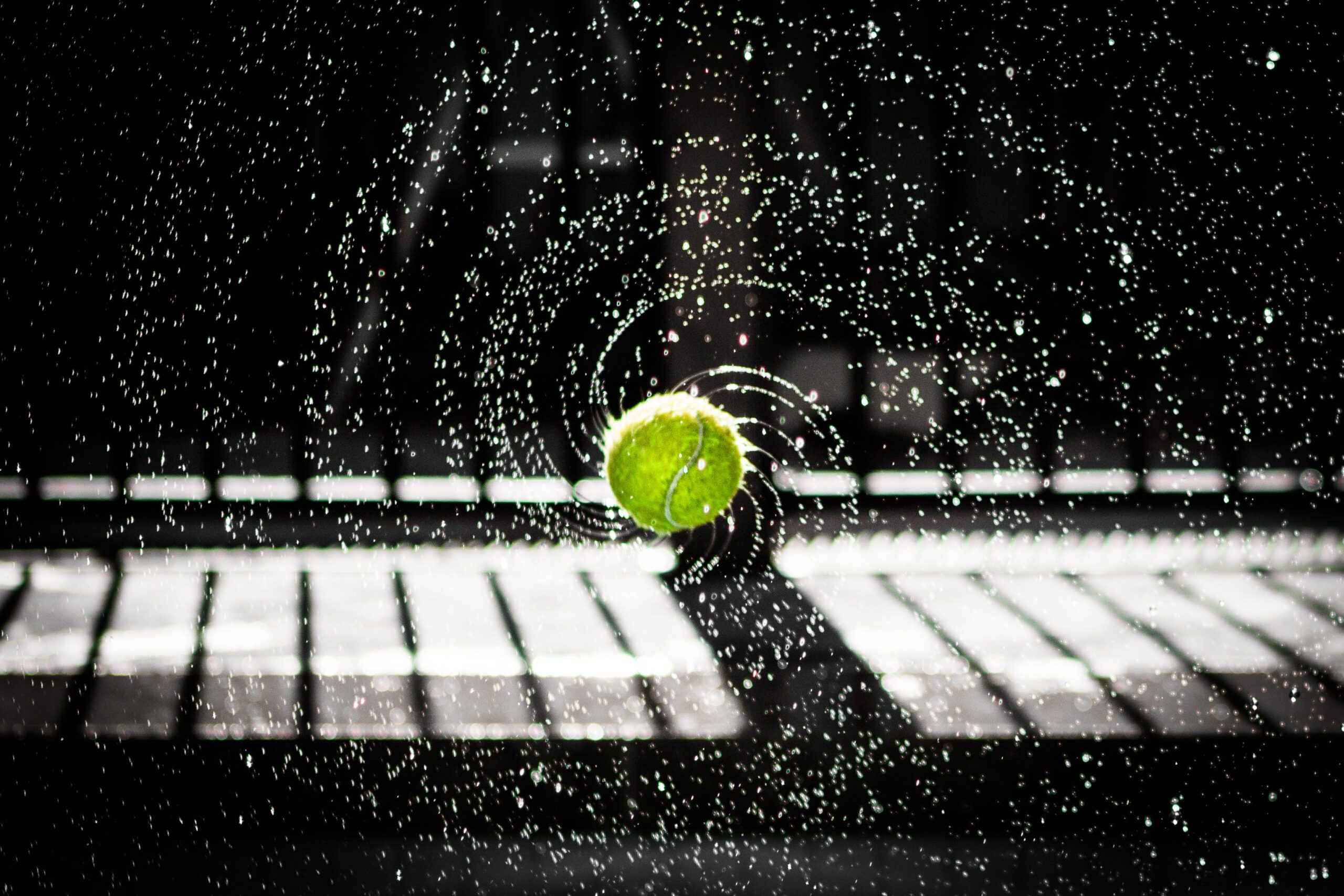What Happens to the Body
By Vernon (Trey) Keeve III
I like playing tennis. There is something about the volley that I take personally, and something about losing the rhythm of that volley that makes the sky and world feel like they are falling in some undefined motion downward. Being the person that interrupts a good volley is a feeling of not belonging where you stand.
I went to tennis camp one summer; it was not a sleep away camp, just a day camp—well an early morning camp—at Kenmore Park in downtown Fredericksburg, Virginia, the park named after Betty Washington, George’s sister.
I was a growing boy, and by growing, I mean overweight for my age. I don’t remember feeling my weight, but it was easy to tell that I ate more and got less exercise than my peers. I could run fast, but asthmatic lungs caused me to fall to last place very quickly. I could start a mile run in the lead during gym class, and at tennis camp, but then I would slow down to a walk for the remainder of those miles around the athletic fields and those jogs around the tennis courts.
My dad started playing tennis in college on courts named after Richmond, Virginia’s own Arthur Ashe, until his aging knees sidelined him. He passed, at least, an interest in the sport to my sisters and me.
I was a big boy. The type of kid that other parents called stocky, sturdy, and probably worse away from the ears of my mother. I was buoyant in my deluded ability to play tennis because my father had been so adept to the sport. I was often teased for being big, so I had to show off when I could. I had to run fast until I couldn’t. In my head, I had to go the extra mile not to appear sloppy—because that was what the world told me I was: sloppy. I was a big boy, but I was still a boy, and my confidence was non-existent (and to be honest it only shows up on occasion now).
I had a best friend one time. We met in the fourth grade. We had the same homeroom teacher. He actually thought I was cool. I don’t know why. Maybe it was because I felt the need to make the class laugh so that they were not laughing at me, but with me. I didn’t share my friend’s interest in sports, which were a big part of who he was—especially football. I tried to collect football cards once, but I assumed all the glossy cards were good players. I was horribly wrong.
He and I liked to stay up late during weekend sleepovers, scaring the shit out of ourselves with horror movies and ghost stories. He lived within walking distance of our middle school, and on lucky days I got to walk home with him, hanging out and not doing homework until my mother picked me up.
We used to saunter to his house on those days, looking for some sort of adventure that would keep us outdoors longer. We always drifted towards water—hoping for frogs, newts, and other life forms that thrived in streams.
The tennis courts we passed on the way stood next to a dangling chain that separated the schoolyard from the street where my friend lived. There were four of them—hard courts with verdant weeds growing through the cracks of their faded emerald tops. I don’t think we ever had a tennis unit in any of the physical education classes that I took at that school, and I can’t recall if there was even a competitive division for middle school tennis—thus the courts were unkempt flatlands in front of the water tower.
I didn’t know the girls we saw there one day, but he did. I recognized their faces from passing them in the hallways, but I didn’t know their names. They were standing on the courts, with their rackets and a ball. He wondered if they would let us play. He asked if we could. Their rackets fell to their sides and their free hands took rest on their hips. Mouths opened.
You can, but not that nigger.
I felt as if I’d been called fat and a faggot all at once, as if a dog was biting and ripping me away at the knees. I didn’t know how to protect myself. I didn’t know which part of me was showing that I needed to hide.
Lowering my voice or covering my boy boobs or checking the limpness in my wrist was not going to save me. It was the first time I had heard the word used that way against me, like a dagger. The blond girl said it first, then the brunette with pigtails.
I responded silently, reminding myself of the only privilege I had—the fact that my father was a lawyer, the fact that I lived in a middle-class subdivision, the fact that my father had a law office and a home within walking distance of where we stood. But that didn’t stop the insults. That didn’t prevent the first time I was called a nigger. Just like being in law school hadn’t stopped my father from being called one. Social class wasn’t going to save me from what was embedded in the melanin of my skin.
What happens to the body
when it is emptied of its record?
Does it crack and dust over
like a reservoir that has gone dry, waiting for
rains to ease chapped mud?
What happens to the flesh
when the muscle atrophies from
a diet of sticks and stones?
What happens to the bones
when the marrow is forgotten?
What happens to the body
when the branch snaps, and no one
is around to hear it?
What happens to the body
after it is first called nigger?
We walked to my friend’s house in silence. His mother saw that I was upset, he told her what had happened, and my mother was called to pick me up. I was spoken to about the word, even though I knew it was tied to my appearance. At that age every slur was linked to my appearance. When I was first called a faggot, I retaliated with, “I ain’t fat.” I’d thought I heard the word with two Ts and not Gs.
It’s funny how our ears turn the whispers of others into our own insecurities.
The older, blonde girl apologized to me the next day. I’d been giving my homeroom teacher an exceptionally hard time being the class clown, so when my pencil slipped from my grip mid-swing of a goofy walk towards her desk, the teacher accused me of throwing it at her and sent me to the office.
I was already terrified of having to hear the disappointment in my mother’s voice and the anger in my father’s after school, so when the blonde girl happened to walk into the office, too, I burst into tears.
She said she was sorry in a raspy and ashamed voice, but I knew she didn’t mean it, and I couldn’t help but always notice her and her accomplice after that—every time I passed them in hall, every time they were in close proximity to my body. When they played field hockey with my sister. When we were in the same gymnasium for pep rallies, and when they cheered at football games. Even as adults, when they cashed and deposited my checks at the bank, or purchased pizza from me at Wegmans. I still recognized them—the aging faces of those two little girls who introduced me to the word.
The haunt is what happens to the body.
The boy and I stayed friends for awhile, until we were teenagers and the friendship dissolved.
After I got my license, I drove to his house. The last time I’d been there was when I was 14, but all we did was fight about music. I was falling in love with rhythm and blues and funk, and he was all about the dichotomies of rap and country. When I pulled into the driveway that day at 16, I saw a “For Sale” sign. No one answered the door. He’d moved to Florida.
He’s sent me friend requests twice since we’ve been adults. The first time just wanting to catch up, though he ended up unfriending me somewhere between my support for a black president and my anger about the killing of Trayvon Martin. The second time was to tell me about the passing of his father, though he unfriended me not long after that as well, somewhere between my posts about the heartbreaking death of Eric Garner and my rage and horror over the murder of Sandra Bland.
Though I continuously get called a faggot, I haven’t been directly called a nigger since that time in fourth grade. But I have filled spaces with it. Syllabi without writers of color. A customer that demanded I thank him for buying a pizza that I made. A teacher telling me that I should not write about race, and the teacher that wanted me to make my grandmother more “ethnic” and “boisterous” in a piece I wrote for an undergraduate writing class.
I hear it when people steer away from my body in predominantly white neighborhoods, and when they look at me with suspicion. I hear it every time the death of a black body is displayed in the news and there’s no remorse by the killer. I hear it when black women are called sassy, and black boys are called thugs. I hear it whenever the conversation is about Michael Vick, and not about the rapist on the team. I hear it when Obama is referred to as the worst president ever.
I heard it when I was the only black student in classrooms. I heard it when I was the only person put into handcuffs out of a group that smelled like marijuana.
I hear it every time my students (of all races) use the word as misnomer for man or person, or as a synecdoche of themselves. I heard when I was “mistaken” for a student and not an adjunct—when a coworker at the college where I used to work asked me where’d I get my keys, and why was I using the faculty bathroom?
I hear it every day when get I on the 580 in Oakland—looking at the green hills to the east and the concrete jumble to the west.
I have not picked up a racket in years, but I get the urge every summer when televisions around me find themselves catching glimpses of Serena. Every year it makes me wistful for those few moments when I found myself in a perfect volley with a competitor. Those few times when I felt I had something to offer to the sport. Sometimes it makes me want to buy a new racket to take up the sport again, but then I remember I have asthma, and there are a few attacks I don’t want to relive.
***
Vernon (Trey) Keeve III, who grew up in Fredericksburg, VA, is a doctoral candidate in the Teaching of English Program at Teachers College, Columbia University where they are researching the cultivation of safe, trauma-informed writing spaces. Trey finds hope in disrupting the power dynamics of classrooms and creating learning spaces where student voices are given more agency in establishing the trajectory of erudition. Their book Southern Migrant Mixtape was the recipient of the PEN Oakland Josephine Miles Award in 2019. Trey can be reached via email at [email protected].


